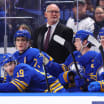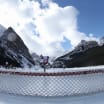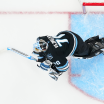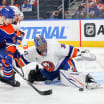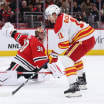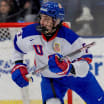While a lot of the focus surrounding the Colorado Avalanche is on whether Darcy Kuemper or Pavel Francouz starts Game 1 of the Stanley Cup Final, the bigger challenge may be making sure each goalie is ready after a long layoff.
Unmasked: Avalanche goalies managing long break before start of Cup Final
Staying in rhythm, maintaining focus key for Kuemper, Francouz ahead of Game 1 against Lightning
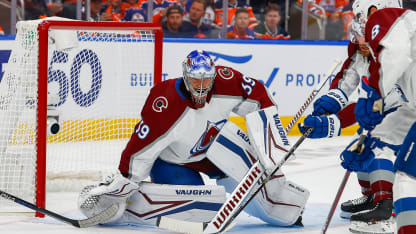
© Icon Sportswire/Getty Images
By
Kevin Woodley
NHL.com Independent Correspondent
The Avalanche will have eight days off after sweeping the Edmonton Oilers in the Western Conference Final. Game 1 of the Stanley Cup Final against the Tampa Bay Lightning is in Denver on Thursday (8 p.m. ET; ESPN+, ABC, CBC, SN, TVAS).
The Anaheim Ducks had 11 days off in 2003 before starting the Final. Their goalie, Jean-Sebastien Giguere, knows firsthand how challenging such an extended time off can be for a goalie, especially in the playoffs.
"It's tricky because it's inevitable you are going to have a little rust," Giguere said. "You have to find a way to make the break to your advantage, to make sure that the rest you have will become beneficial as the series goes on, and obviously the rust you have cannot last two games. You expect it the first 10 minutes, the first period, but that has to be it."
RELATED: [2022 Stanley Cup Final schedule | Stanley Cup Final coverage]
Giguere got used to a long layoff by the time the Ducks reached the Cup Final that season. He had to manage an 11-day break between the first and second round, a gap that is tied for the second longest between any playoff series after the 13 days that the Montreal Canadiens waited before playing the Seattle Metropolitans in 1919.
The challenge for goalies with a long break is maintaining their rhythm. They rely on feel and timing to some extent, though how much can vary, sometimes even based on style.
Los Angeles Kings goalie coach Bill Ranford helped Jonathan Quick navigate an eight-day break between the Western Conference Final and Stanley Cup Final in 2012. Quick made 49 saves while winning Games 1 and 2, each by a 2-1 score in overtime.
Ranford says he wouldn't be as worried about the layoff a decade later because Quick has an improved technical foundation.
"The way 'Quickie' used to play back 10 years ago, probably would have been a little bit more concerned than I would be today just because he's got so much more structure in his game now," Ranford said. "I think guys that play with a little more structure might have it easier."
There can also be a difference between how starting goalies manage a long break compared to backups, who are already used to handling prolonged periods between starts.
Winnipeg Jets backup Eric Comrie averaged more than 19 days off between his nine starts over five months from Nov. 19 through April 19 this season, including two 18-day breaks, a 20-day break and a 49-day gap from Dec. 10-Jan. 29. He said the challenge is different for a backup, who must deal with the pressure that a poor performance could mean not getting another start for a while.
"For a starting goalie, it's hard because you're so used to playing every game that you just stay in rhythm," Comrie said. "[Jets No. 1 Connor Hellebuyck] always talked to me about it and he said, 'if I go a week without playing, I lose all my rhythm and my feel.' So, for him it's all about rhythm and his reads, and he starts to lose those when he misses his time. Whereas for me as a goalie that didn't play as much, it's more 'I need to play good to play again.' So you put added pressure on yourself and when do that usually you play a little stiff and a little tense."
The break before the Cup Final might be easier for Francouz, who managed gaps of 10, 17 and 22 days between starts during the regular season and went 21 days between appearances in the Western Conference First Round and conference final, than it is for Kuemper, whose longest healthy break between appearances during the regular season was eight days.
"I feel like you have a lot of rest, and then when you go in, you're super fresh," Francouz said Friday. "You're excited about the game because you haven't played for a little bit, so that definitely helps."
Kuemper returned successfully from a nine-day gap between games after sustaining an eye injury in the first round against the Nashville Predators and saved 23 of 25 shots in Game 1 of the second round against the St. Louis Blues. But after leaving Game 1 of the conference final against Edmonton with an upper body injury, Kuemper is now looking at 14 days off.
According to the goalies and coaches that have been through long gaps, the key to staying sharp for Kuemper will be finding some of his missing feel in practice.
Roberto Luongo doesn't remember much about how he managed the eight-day break with the Vancouver Canucks before making 36 saves in a 1-0 shutout win over the Boston Bruins in Game 1 of the 2011 Stanley Cup Final but knows how he would handle it now.
"If I had to do it today, I'd bring game intensity to every practice," said Luongo, who is now a special adviser to Florida Panthers general manager Bill Zito and leads their four-person goaltending excellence department. "Play out every shot. Follow every rebound."
Coaches can help by trying to create game-like intensity in practice, but it's also important to find a way to mimic the chaos of games, with goalies having to find the puck among 10 bodies moving around the zone, which is why Ranford tried to include scrimmage sessions.
"You want game-like traffic, game-like motion instead of just doing traditional drills you'd do in the regular season like 2-on-1 or 3-on-2 rushes," Ranford said "It's getting 10 guys involved where you have multiple layers of traffic or multiple guys net front. It's trying to create that chaos, those quick plays behind the net when you come off a traffic situation, so it's stuff that is a little bit harder to replicate in drills if you only if you've only got a few guys doing it."
Getting teammates to understand the importance of game-like intensity in those drills and scrimmages is key.
"Practice has to be 100 percent, everybody is all out," Giguere said. "This late in June, the last thing you feel like is practicing and putting in hours at the rink but you have to do it hard and do it well and approach every practice that way. I know there's a lot of guys that are hurting but you can't afford to take two games before you get going because it might be too late."




